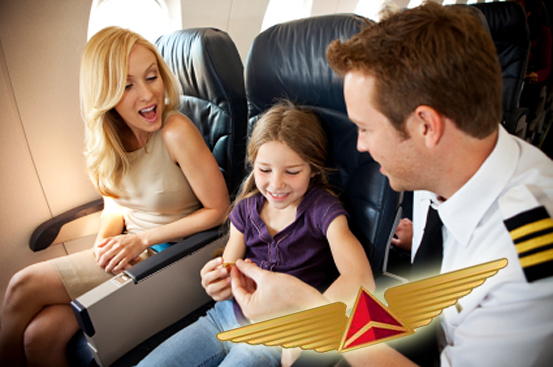At least one major U.S. airline has restarted an old tradition: giving away little plastic wings to kids.
This practice had been curtailed in the wake of the 2001 terror attacks. If I told you the curtailment was done as a cost-cutting measure, well, that would be embarrassing enough (a set of wings can’t run more than a penny or two). Actually, it’s worse than that. The real reason is almost too pathetic to be believed: Transportation Security Administration banned the distribution of toy wings because of the small metal pin affixed to the backside.
I am not making this up. And we are asked to imagine a terrorist attempting to hijack a plane with a set of plastic kiddie wings.
Granted, it’s nice to see the wings again — assuming there’s a kid somewhere who is still made happy by such small gestures. Just as passengers can once again enjoy their first-class entrees with actual metal cutlery. Somebody, somewhere, was sane enough to let this happen.
But somebody else was daft enough to outlaw these things in the first place. And rest assured such silliness will happen again. Lesson being: Never, ever underestimate the American capacity for shameless overreaction. We see it on all scales, from the dropping of bombs to the prohibition of harmless trinkets for young children.
At least, in the meantime, we are protected from the menace of snow globes.
– – – – – – – – – –
Another thing that our insane preoccupation with safety and security has helped ruin: the idea of passengers from other countries using the United States as a stopover point.
Why does the U.S. not recognize the concept of being in transit, as pretty much everywhere else in the world does? Instead, all foreigners arriving in the United States, even if they are merely in transit to a third nation, must pass through immigration, claim their bags, and be rescreened by TSA before proceeding onward to their connecting flight.
For example, flying from New York to Bangkok, with a change of planes in Tokyo, one does not “enter” Japan. You never leave the secure transit area, and your luggage is transferred automatically to the next flight. It’s quick, convenient and painless. Passing through Europe, same thing. By contrast, a person flying from, say, London to Costa Rica, via Miami, faces a hostile marathon of lines and checkpoints in Miami. First you have to clear customs and immigration. This means a fingerprinting and having your picture taken (and many foreign nationals require a visa, even if they’re just passing through). Next, you are forced to claim and recheck all of your luggage. And lastly, of course, comes the TSA screening, where you are liable to have your duty-free items confiscated, among other indignities.
Yes, you’ve been through security already, when you left Europe or Asia or wherever you’re coming from. And yes, now you will go through it again, TSA-style. This applies to all connecting passengers, including U.S. citizens. The government’s reasoning is that passengers now have access to checked luggage, and could theoretically remove some hazardous item from a bag and sneak it into one of their carry-ons. No effort is made to segregate those with checked bags from those without, and so everybody has to endure this nonsense. Not even crew members are exempt. Coming in off an 11-hour flight, I need to pass through a full TSA screening just for the chance to stow my flight case in the crew lounge. (This while the baggage loaders and caterers saunter through unmolested, but that’s another story and don’t get me started.)
All together this obstacle course can easily take 90 minutes or more, not counting visa and paperwork hassles beforehand. And this is one of the reasons that a dwindling number of foreigners book connecting tickets via the United States anymore.
What the benefits of this system might be, if any, I can’t say. The idea that we’re “safer” is an extremely tough sell. But the downside is obvious: millions, if not billions of dollars in lost commerce — not to mention a loss of respect. U.S. airlines miss out on millions of annual passengers. Flying from Australia to Europe, just to pick one example, people could easily connect via Los Angeles or San Francisco instead of in Asia or the Middle East. But few, if any, do. And who can blame them?
Airports like those in Singapore and Dubai and all throughout Europe efficiently process tens of millions of transit passengers each year. All down the line people benefit, from the passengers themselves to the airlines and vendors they patronize. American terminals should be set up this way also.
– – – – – – – – – – – –
Do you have questions for Salon’s aviation expert? Contact Patrick Smith through his website and look for answers in a future column.

